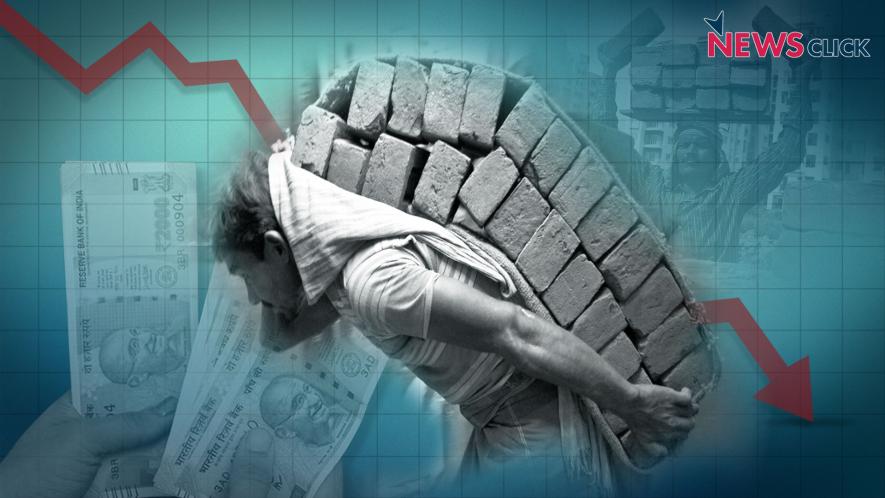Modi Govt and Its Lack of Concern for the Working Class

When Elizabeth Warren, a contender for American presidency, had proposed a progressive wealth tax during her campaign for Democratic Party nomination, 18 American billionaires had come out in support of her proposal; but one cannot recall or even imagine any comparable behaviour in the Indian context.
This is not because the American, or more generally Western, capitalists are particularly kind or generous towards those whom they exploit. It is because of their belief that the undisturbed functioning of the capitalist order in their countries requires a degree of concern on their part for the poor; it is a matter of their own easy survival.
A similar difference can be perceived between the two sets of ruling classes with regard to their respective rescue packages during the pandemic. The pandemic and its associated lockdown meant a sharp drop in the GDP both in the West and in India, and hence a sharp drop in tax revenue. The sheer maintenance of government expenditure, even in the absence of any pandemic, would therefore have entailed a rise in the proportion of fiscal deficit to GDP. This automatic increase in the fiscal deficit ratio would be larger, the more severe the lockdown.
Simply comparing the relative sizes of the fiscal deficits to find out the magnitude of rescue packages therefore would be wrong. One needs specifically to examine these packages to discover the scale of discretionary fiscal support for the poor.
While the European Central Bank, comparing simply the increase in the ratio of primary deficit (excluding interest payments) to GDP between 2019 and 2020, arrives at figures of 6.7% and 9.8% for the European Union and the US, respectively; these figures give no idea of the discretionary fiscal support. But an ECB report puts the magnitude of discretionary fiscal support at 4.2% and 7.8% of GDP for the EU and the US, respectively, for 2020. (The IMF puts the discretionary fiscal support in the US at a much higher figure, 16.7% of GDP).
No matter which of these figures we accept, all of them are much higher than the figure for India, where the discretionary fiscal support came to somewhere between Rs 1.65 and 1.9 lakh crore, which is less than 1% of our GDP. There is, in short, a world of difference between the West and India with regard to the support given by the government to the people during the pandemic.
Also read: To Borrow or Not to Borrow? Modi Govt in Fiscal Policy Bind
This is also evident from another fact. While there have been measures of universal support in the US, i.e. to every household, no such measures have been adopted in India despite the pleadings of a host of economists, civil society organisations, and political parties. Biden’s package for instance visualises the payment of $1,400 to every individual earning less than $75,000 per year, and of $300 per week to every jobless person until early September. But it is not just Biden, even Trump had unrolled a package in which there were such universal transfers to the poor. By contrast, there have been no such universal transfers to the poor in India.
Whatever succour the working people as a whole (as distinct from a few targeted groups) have got has been not in the nature of transfers but as payments under the Mahatma Gandhi National Rural Employment Guarantee Scheme (MGNREGS). The number of workers engaged under the scheme increased by 41.75% between 2019-20 and 2020-21, from 7.88 crore to 11.17 crore. This increase was mainly because of the return of the migrant workers to their villages after having lost their places of residence and sources of income following the sudden lockdown. They swelled the unemployed rural workforce and took up work under the MGNREGS.
They got their incomes, in other words, not as transfers financed by the fiscal support of a responsive State, but by working their guts out in projects requiring manual work. In fact, the insensitivity of the Indian State was nowhere as evident as in its not putting a moratorium on the eviction of tenants during the lockdown, a measure adopted in the US even under the Trump administration.
It may of course be argued that providing a larger rescue package would have enlarged the fiscal deficit ratio even more and this would have been unacceptable to global finance and its institutions like the IMF. But while this argument has much relevance for other third world countries, the Indian case cannot be explained in this manner.
The Indian State did not even push for such measures; it was under no compulsion, either by the IMF or through the beginning of a deluge of financial outflows, to rein in its expenditure, even within the neoliberal framework. Its parsimony, therefore, can only be attributed to its utter lack of concern for the working people. This brings us back to the contrast in ruling class behaviour towards the poor between the Indian and the Western cases.
Also read: Why Modi Govt Looked the Other Way on Giving Cash Relief During Pandemic
At least three factors can be adduced as underlying this contrast. The first is the lack of bargaining strength of the Indian working people, the overwhelming majority of whom consists of unorganised workers. The levels of unemployment are exceedingly high, and the “employment rationing” among the workforce takes the form not of some being fully employed and others being fully unemployed, but rather of each one being employed for only a part of the time.
Organising the workers becomes doubly difficult under these circumstances, first, because of the sheer magnitude of unemployment, and, second, because of the fact that this unemployment affects such a large number of people over whom it is spread thinly. The labour laws rushed through Parliament by the Modi government during the pandemic will only make matters worse for the workers.
The question may be raised: even if the organisations of workers, peasants, and agricultural labourers may be weak, they can after all put political pressure on the government by voting against it during elections. Indeed, the very fear of this happening should make the government sensitive to their needs, and hence sympathetic to their plight.
But, here we come to the second factor that is particularly relevant in the case of the Modi government. Its confidence in dividing the people along communal lines, in bringing about a majoritarian consolidation behind itself is so absolute that it thinks it can afford to be unconcerned about the conditions of the working people qua working people.
No matter if the lockdown declared is draconian, no matter if it is declared at four hours’ notice, no matter if lakhs of migrant workers are thrown into the streets trekking their way back to their villages, no matter if they are denied any assistance and are forced to slog it out doing arduous manual work under the MGNREGS to earn their daily bread, come election time and their votes can be garnered by the ruling party through communal polarisation; or so that party thinks. It is this thinking which makes it totally unresponsive to the material needs of the working people.
Also read: Pandemic Rescue Package: Biden and Modi – a Study in Contrast
The third factor is the tradition of unconcern towards the poor and the working people that has characterised Indian society for long because of the caste system. The working people belong largely to the depressed, so-called “lower castes”, and the insensitivity towards the “lower castes” carries over into an insensitivity towards the needs of the working people.
The anti-colonial struggle, occurring within a historical context of advancing socialism, had to a significant degree overcome this attitude, and created the vision of an India where people enjoyed equal rights as citizens irrespective of caste, class, religion or gender. But, with the change that has occurred in the historical context in a regressive direction, the old prejudices are back with a vengeance.
It is noteworthy that G D Birla had once written a letter to some of his fellow industrialists that they should not flaunt their wealth so openly, for that would turn public opinion against them. It is a sign of the change that has occurred in the historical context, that a top industrialist of today can flaunt his wealth by having a massive, multi-storey mansion in the middle of Mumbai; and instead of being pilloried for it, he is hailed by none other than the Prime Minister as a valued “wealth-creator”!
Get the latest reports & analysis with people's perspective on Protests, movements & deep analytical videos, discussions of the current affairs in your Telegram app. Subscribe to NewsClick's Telegram channel & get Real-Time updates on stories, as they get published on our website.
























